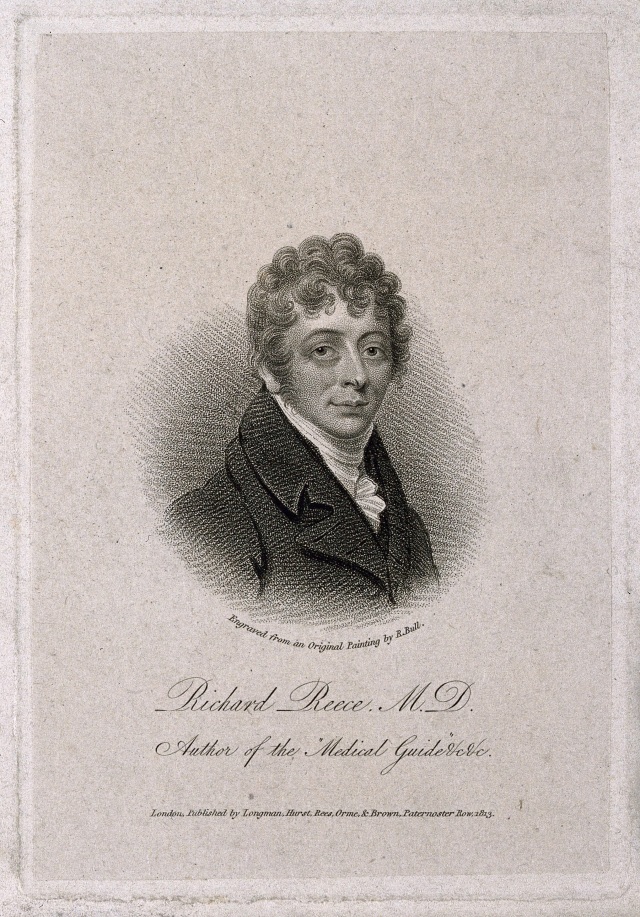I accidently came across this beautiful medicinal chest on the Wellcome collection website and decided to find out more about Reece.
Dr Richard Reece was born in 1775 and at the age of twenty was resident surgeon at Hereford Infirmary. He became a member of the Royal College of Surgeons of England in 1796.
In 1799 Richard, by now a well-established doctor, married Kitty Blackborow, the daughter of Justice William Blackborow. The couple had 9 children, of which according to Richard’s will, 3 of the five girls survived into adulthood, along with 4 boys.
Not only was Richard a well-respected doctor, but he also wrote many papers and books about medicine and in 1813 wrote a Dictionary of Medicine. He also sold medicines and medical equipment from his premises, including medical chests, as we can see here, on his trade card.
He also sold medicines and medical equipment from his premises, including medical chests, as we can see here, on his trade card.
His business operated from 170 Piccadilly and his medical chests were said to have been designed by a man with the flamboyant name of Francis Columbine Daniel who had an equally flamboyant life, but that’s another story.
Richard, it appears was also one of the doctors involved in the case of Joanna Southcott, who, aged 64 claimed to be pregnant, you can find out more about the story using the highlighted link. It always amazes me how I disappear down one proverbial rabbit hole and end up finding something I really wasn’t expecting.
Early September 1814 it was recorded in the Bath Chronicle and Weekly Gazette, that Dr Richard Reece, of Piccadilly had ‘ascertained by personal examination and confirmed that Joanna Southcott was undoubtedly pregnant‘. This of course, it transpired was untrue. Richard was mocked for this as can be seen in this caricature.

However, perhaps in order to set the record straight, Richard was also the doctor who led the post mortem on Joanna. Perhaps this redeemed him from his initial mistake.
In 1827 the Morning Chronicle Richard suffered a break in at his premises. Lyon Lyons, a known receiver of stolen goods was charged with having stolen thirty smelling bottles, with gold and silver tops, valued at £15, two medicine chests, £8 in money and other articles. Instead of the focus being on the thief, Reece was challenged by counsel for the defence about swearing the oath on the bible. It was stated that perhaps as a follower of Joanna Southcote, this was inappropriate. So, there he stood some 14 years after Joanna’s death still being challenged about his view that she was pregnant and that he was one of her believers. Eventually Lyons was found guilty of the crime.

Richard died from a liver complaint in early October 1831, and, in his will, he stipulated that he should be buried at St George’s burial ground to join his two daughters, Emma and Kitty. He left one shilling to his son William, a chemist at Worcester, he said that he couldn’t leave him more due to funding his son’s move to Worcester. He left his business in trust for his three remaining sons, George, Richard and Henry for at least two years until they were deemed worthy of it. His wife Kitty lived until 1863.
Although not one of Richard’s cabinets, how wonderous is this example from the Rijksmuseum.
Finally, there is an interesting article on the website of New York City Museum about the restoration of one of Richard Reece’s cabinets – link.
Sources
ODNB
Parish registers of baptisms, marriages and burials
Records of the Prerogative Court of Canterbury, Series PROB 11; Class: PROB 11; Piece: 1791a




What a beautiful medical chest that is!
I wonder if Richard has living descendants today?
LikeLike
Isn’t it just. I think we can be fairly sure that Richard has living descendants given the number of child he had who survived into adulthood. It would be lovely to think that if one of them read this piece that they would make contact … you never know 🙂
LikeLike
Thanks for this interesting article. I must try and get a look at a copy of Reece’s Dictionary of Medicine. He sounds to have been quite commercial minded with his drug sales and medicinal cabinets, although I suppose in those days a physician had to diversify to ensure a decent income. Very surprised that for a respected medical man he was taken in by Southcott’s fraud.
LikeLike
Thanks Penny. There are copies of Reece’s works available vi Wellcome Collection – https://wellcomecollection.org/works?query=richard+reece and a copy of the one you mentioned via Google – https://books.google.co.uk/books?id=zJ9dAAAAcAAJ&printsec=frontcover&source=gbs_ge_summary_r&cad=0#v=onepage&q&f=false
I think that his involvement in Southcott’s autopsy was a way to salvage his reputation.
LikeLiked by 1 person
Pingback: Merkwaardig (week 7) | www.weyerman.nl
Wonderful article.
I wonder what the compounds were in that medical chest. These would be the medicines that would be considered effective, but also readily available.
LikeLike
Thank you so much. You can zoom in to look at the chest more closely via the Wellcome Collection website where all the items are clearly labelled – https://wellcomecollection.org/works/xwxhxney/items
LikeLike
Thanks. I was reading the post on my cellphone. I will definitely take a closer look on the computer.
LikeLiked by 1 person